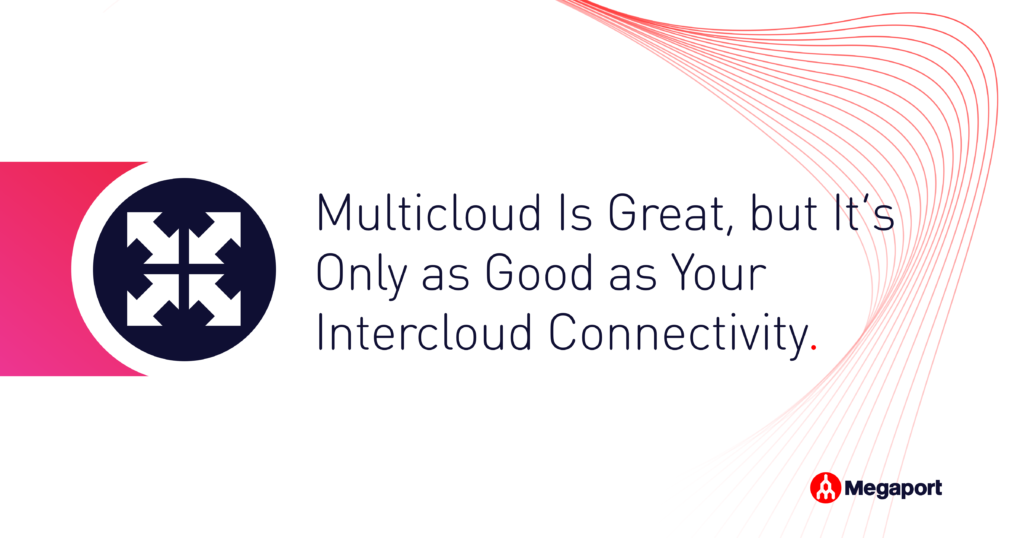
Multicloud Is Great, but It’s Only as Good as Your Intercloud Connectivity
- Cloud networking
- June 18, 2020
- RSS Feed
Enable direct cloud-to-cloud connectivity with Megaport Cloud Router (MCR). Avoid latency, reduce costs, and simplify multicloud networking without hardware or cabling.
A fast and flexible virtual network can fulfill the promise of multicloud.
According to Gartner, 81% of organisations use services from two or more cloud providers. That’s an astonishing majority, and one that may only increase in the future as the enterprise world increasingly favours multicloud strategies.
But, here’s the problem. The cloud is all about flexibility, and the promise that you can access critical data and systems from anywhere. With multicloud, this promise isn’t fulfilled. That’s because, though you can access all your data in different physical locations, you can’t access it from different virtual locations. One cloud can’t directly access another’s data, leading to all kinds of integration barriers.
Of course, you can always send the data back to your infrastructure first, then send it on to another cloud provider from there. But then your multicloud future is limited by the need for your own data centre to act as a cloud middleman.
There must be a better way, right? Read on, and we’ll explain how you can directly link multiple clouds together to unlock the true potential of multicloud.
Why Use Multicloud at All?
To understand the real benefits of cloud to cloud connectivity, it’s worth diving into the reason enterprises adopt a multicloud strategy in the first place.
Gartner identifies three main reasons why enterprises want to work with multiple cloud providers:
- Minimise vendor lock-in
- Make the most of modular application design
- Simplify governance by standardising tools across clouds
While any multicloud approach will help you spread sourcing across multiple vendors, the drive for modular, scalable applications is undermined by conventional cloud connectivity.
Gartner explains that “modern applications…can span multiple cloud providers and consume services from multiple clouds.” But without the right connectivity between clouds, the links between modules are often slow, unreliable, and prone to high latency, preventing these applications from functioning as expected.
The Problem With Intercloud Connectivity
The issue with conventional networking approaches is that they treat your infrastructure as the centre-point of your data universe. So, data needs to stop off at your data centre before you can route it anywhere else it needs to go.
That’s fine if you only use a single cloud provider. But many don’t, and a survey from Flexera has shown that the average enterprise uses just shy of five clouds. If you’re the kind of business that relies on many cloud architectures, the constant stopping off back at your on-premises infrastructure will add unnecessary latency and hog network bandwidth.
The solution, as you might expect, is to build in a dedicated connection between your cloud providers. However, that can be a costly and complex undertaking. And, depending on which providers you connect between, some may not be able to install a cross connect between their infrastructure and a competitor’s data centres.
Even if you do negotiate the terms successfully, installing direct cabling between multiple cloud systems is a major project, especially if you rely on a vast roster of cloud providers.
Thankfully, there’s a simpler, less expensive, and more flexible way to directly connect between different cloud providers.
Megaport Cloud Router: a Less Expensive and Faster Way to Connect Your Clouds
Megaport Cloud Router (MCR) offers full cloud-to-cloud connectivity. That means your data can move between different cloud architectures directly, without having to stop off at your data centre first.
Whether you use two cloud providers or two hundred, and whether you favour cloud infrastructure or software-as-a-service solutions, MCR can help you privately peer between them all to improve performance, reduce latency, and save valuable bandwidth across your network.
And because it’s a software-defined solution, there are no cables to lay and no hardware to configure. In fact, you can spin up new connections in MCR in a matter of minutes.
It all adds up to a faster, more flexible network that helps you finally fulfil the promise of multicloud.
Learn More About MCR
Cloud-to-cloud connectivity is just one of the many benefits Megaport Cloud Router can offer. Learn more about MCR, and how it can help you take a more flexible approach to networking and connectivity.


